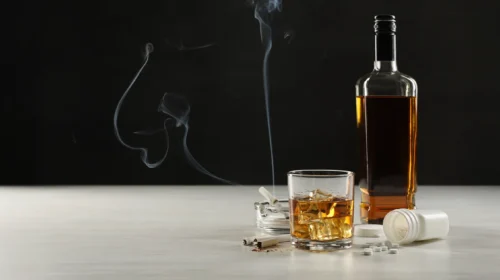Sleep problems caused by addiction are known as substance-induced sleep disorders, and a person’s sleep habits are known as sleep hygiene. The unfortunate truth is that a person’s sleep hygiene can be easily disrupted, especially by substance abuse. Sleep disorders and substance abuse disorder (SUD) are intricately linked, and according to the National Center on Sleep Disorder Research, “All psychiatric and substance abuse disorders are associated with sleep disruption.” Sleep disturbances, especially insomnia, are often the hapless heralds of substance abuse, and often is also seen as a symptom of substance use disorder. Any kind of intense sleep disturbances can lead to abuse, which in turn can cause another set of separate sleeping issues, evolving into a vicious cycle that can ultimately result in an increased possibility of relapse.
Certain drugs and classifications of drugs can damage a few different neurotransmitter systems that influence sleep patterns, including acetylcholine, dopamine, the gamma-aminobutyric acid (GABA) receptors, glutamate, and orexin. Other neurotransmitters like serotonin and norepinephrine help regulate sleep states, and drugs like alcohol and opiates interfere with these mechanics. According to one estimate, those struggling with the disease of addiction are between five and ten times more likely to have comorbid sleep disorders, which are suspected to cause a high relapse rate.
Alcohol Addiction and Its Effects on Sleep
Many people mistakenly believe that because alcohol is a depressant, it will help them with their sleeping habits. This is false, however, because regardless of whether someone suffers from alcohol addiction, sleeping after overdrinking increases the risk of nightmares, wetting the bed, night sweats, heavy snoring, and sleep apnea. Alcohol increases slow wave sleep but decreases rapid eye movement (REM) sleep. In layman’s terms, alcohol-induced sleep isn’t restful sleep. REM sleep is the stage of sleep where we dream and commit the things we’ve learned from the day before to memory, and scientists have linked daytime cognitive performance with getting enough REM sleep. Those who use alcohol to self-medicate for insomnia exponentially increase their risk for addiction, and those who experience sleep disturbances during abstinence also increases risk for relapse.
Stimulants and Sleep Disorders
Stimulants are all energizing drugs, with chronic use leading to an increased wakefulness and lack of sleep. Consistent use of ecstasy and cocaine both reduce the amount of REM sleep an individual receives, causing enough sleep deprivation to impact daytime cognitive performance. Amphetamines and related stimulants increase the amount of dopamine released while under the influence of the drug, leading to a deficiency in total sleep time and efficiency. MDMA specifically has an intense effect on brain function and overall sleep hygiene because over time it eats away at the brain’s serotonin levels. Serotonin helps produce melatonin, so those who abuse ecstasy and mollies experience symptoms related to sleep deprivation sooner than those who abuse other types of drugs.
How Opioids Affect Sleep Hygiene
Although they often act like sedatives and have drowsy effects, opiates and opioids increase overall wakefulness while decreasing total sleep time, slow wave sleep, and REM sleep. Opioids cause changes in an individual’s sleep architecture through the times of intoxication, withdrawal, and abstinence, causing overall restlessness and insomnia. Those who abuse opioids experience less REM sleep— in fact, REM and deep sleep time are both cut in half when an individual is chronically ingesting the drugs. Opioid abusers get less sleep overall and are at an increased risk for central sleep apnea, and the total combination of all the adverse side effects cause enough restless sleep and sleep deprivation to affect the individual suffering from substance abuse disorder both mentally and physically throughout the day. This can result in the worsening of memory and tolerance for pain, causing more pain and fatigue in the long run and nullifying the original intent of the painkillers.
What About Other Drugs?
Marijuana, sleeping pills, caffeine, and nicotine all affect our sleep hygiene and sleep cycles as well, either causing restless sleep, drowsiness during waking hours, or acute wakefulness to the detriment of the user. Many people will use marijuana as a sleep aid due to the lethargy and drowsiness certain strains promote but smoking decreases and suppresses the amount of REM sleep the user experiences, which can cause odd and extraordinarily vivid dreams for months after quitting.
People will also take sleeping pills in order to fall asleep easier, although they are mistakenly thought of as harmless or not as dangerous medications because they can be purchased over the counter. Those taking sleeping pills will often raise their dosage without instruction from a doctor, which can cause them to become physically dependent on the medication to be able to fall asleep.
Nicotine increases sleep latency while decreasing total sleep time and slow wave sleep, and smokers often have trouble maintaining sleep without experiencing disturbances or nightmares. Those going through nicotine withdrawal can have poor quality sleep and an increase in nightly awakenings.
Caffeine is one of the most commonly used drugs, with many people drinking coffee in the mornings to wake themselves up. A stimulant, caffeine increases overall wakefulness for up to six hours after consumption. However, it’s easy to build tolerance and dependence, and those going through withdrawals can experience headaches and migraines, as well as overall fatigue.
Recovering with Sleep Disorders
Various substances of abuse are associated with sleep disorders, including insomnia, daytime sleepiness, parasomnia, and sleep apnea. Sleep disturbances are common in addictive disorders and in various phases of an individual’s substance abuse. These sleep disturbances can often complicate the course of recovery and can sometimes be severe enough to reverse drug of alcohol treatment success. Regardless of whether the sleep disorder initiated the substance abuse or substance abuse precipitated the sleep disorder, addiction treatment can help you or your loved one overcome the complications that arise with these co-occurring disorders. Call Recovery Unplugged today to begin the journey towards recovery.

























